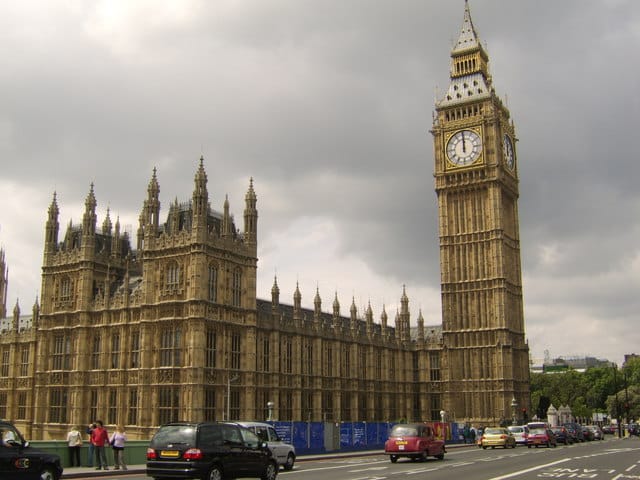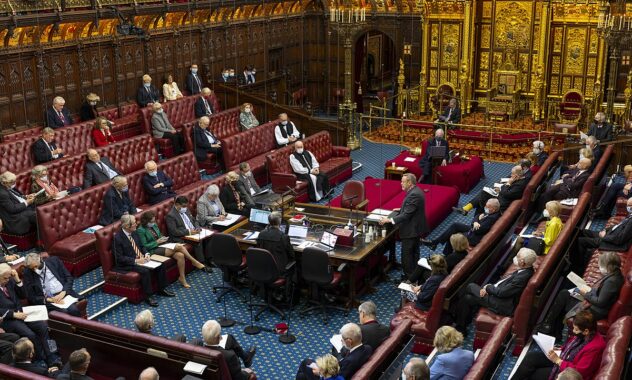Government lays down Minimum Service Levels regulations in Parliament
via Hansard

On Wednesday 8th November, the Government laid down a series of extensions to the Strikes (Minimum Service Levels Act), which covered rail workers, ambulance staff and border security in regulations made in written statements by each respective Minister.
Huw Merriman, Minister of State, Department for Transport said:
“I am pleased to inform the House of the laying of The Strikes (Minimum Service Levels: Passenger Railway Services) Regulations 2023 before Parliament, following publication of the Department’s response to its consultation on implementing minimum service levels for passenger rail. This represents an important step towards meeting the Government’s manifesto commitment.
The Government are focused on making the hard but necessary long-term decisions that are in the best interests of the country, to put the UK on the right path for the future. The railways enable millions every day to travel to work, access vital services like education and healthcare, and visit family. They also provide choice about where to live and work. Passengers, however, are unable to go about their daily lives when unions take strike action. Rail workers deserve a fair deal, but it is not fair to let the trade unions undermine the livelihoods of others. Minimum service levels already operate in other countries, such as Italy, Spain, and others. There are a number of different approaches to deploying minimum service levels for transport and we have developed a specific approach that will work for passenger rail in the UK.
The Government are firmly committed to striking a fair balance between delivering benefits to passengers, supporting them to make important journeys, and the ability of rail workers to take strike action. The public need reliable and consistent services, and any strike action should not disproportionately impact this, or the wider economy.
The consultation response sets out the evidence received from the public consultation and further engagement, as well as the approach to specifying the relevant passenger rail services and designing the minimum service levels that can be applied to strikes affecting those services.
The regulations will apply in England, Scotland, and Wales and specify three categories of services that will be in scope: train operation services; infrastructure services; and light rail services. Each category has a separate MSL. We have designed the regulations in this manner to address the particular nature of strike action in passenger rail, while ensuring that minimum service levels are proportionate and operationally viable for in-scope employers, given the complex nature of the rail industry.
Relevant rail industry employers are able to make use of minimum service levels as soon as these regulations come into force, which is anticipated to be early December, subject to parliamentary approval.”
Will Quince, Minister for Health and Secondary Care, said:
“The Government are focused on making the hard but necessary long-term decisions that are in the best interests of the country, to put the UK on the right path for the future. The Government’s priority is to ensure that when strike action takes place in the NHS, the safety of patients is protected as far as possible.
Minimum service levels are in place in a range of countries in Europe and beyond, as a way of balancing the ability of employees to strike with the needs of the public. The International Labour Organisation (an agency of the United Nations) recognises that this is justifiable for services where their interruption would endanger citizens’ life, personal safety or health. Disruption to ambulance services puts lives at immediate risk.
On 6 November 2023, the Government published the response to the consultation on “Minimum service levels in event of strike action: ambulance services in England, Scotland and Wales”. In it we confirmed that, subject to parliamentary approval, we will introduce regulations which set minimum service levels and cover the 10 NHS ambulance trusts in England, as well as the ambulance services provided by the Isle of Wight NHS Trust. While the UK Government think that people across the UK should be able to be confident about what types of situations the ambulance service will respond to on strike day, they recognise that responsibility for the operation of these services in Scotland and Wales lies with the devolved Administrations. We therefore intend for the regulations to apply to England only at this time, rather than also including Scotland and Wales.
The services included in the minimum service levels will be the 999 and healthcare professional (HCP) call handling and emergency ambulance response to those calls, inter-facility transfers (IFT) and non-emergency patient transport services (NEPTS). The overarching principle is that those cases that are life-threatening, and those for which there is no reasonable clinical alternative to an ambulance response, should receive a response as they would on a non-strike day. In the case of NEPTS, patients for whom there is no reasonable clinical alternative to the patient receiving health services on the strike day should have their transportation provided as they would on a non-strike day.
Our response to the consultation reaffirms our commitment to ensuring that patients can access ambulance services when they need them during a strike. We have laid regulations which will address the inconsistency and uncertainty of relying on the unions to agree arrangements on a case-by-case basis, by giving employers the power to issue work notices should they need to. This will increase public confidence in the service and better protect patient safety during periods of industrial action.
The Government will shortly lay a statutory code of practice in Parliament for approval on the reasonable steps trade unions should take in order to meet the legal requirements under the Act. This follows a commitment made during the passage of the Act through Parliament to bring forward such a code of practice and the recent conclusion of a public consultation on the draft code. Separate non-statutory guidance will also be published shortly on the issuing of work notices by employers, where the regulations apply, to secure minimum levels of service on strike days. The consultation response has been published on gov.uk. The Government wish to thank everybody who took the time to provide feedback as part of the consultation process.”
Robert Jenrick, Minister for Immigration said:
“On 6 November, the Government published their response to a recent public consultation on establishing minimum service levels on strike days in the border security sector. The Government are focused on making these hard but necessary long-term decisions to deliver the change that the country needs to put the UK on the right path for the future. That is why the Government have now also laid regulations before Parliament, setting out the border security services which must be provided on a strike day, together with the level of service to be provided.
Under the regulations, the following border security services will be provided: the examination of persons arriving in or leaving the UK; the examination of goods imported to or exported from the UK; the examination of goods entered for exportation or brought to any place in the UK for exportation; the patrol of ports, the sea and other waters within the seaward limits of the territorial sea adjacent to the UK; the collection and dissemination of intelligence in respect of those services; the direction and control of those engaged in providing these services; and such passport services as may be necessary for national security reasons. These services must be provided at a level that means that they are no less effective than if a strike were not taking place.
The ability for staff to take strike action is an integral part of industrial relations. However, the security of our borders is something we cannot compromise. We must also consider the disruption caused to—and the costs incurred by—passengers and businesses, who expect essential services they pay for to be there when they need them.
We also have to consider the impact on those called in to cover for staff who are going on strike, including the impact on members of our armed forces, who have commendably stepped up to fill vital roles during recent industrial action. It would be irresponsible to rely on such short-term solutions to protect our national security.
Minimum service levels exist in a range of countries within Europe, and globally, as a legitimate mechanism to balance the ability to strike with the needs of the public. Outright bans on striking are usually in place where border security is provided by the police or by members of the armed forces. The exact picture is complex and differs from country to country. Minimum service levels are generally negotiated between employers and unions and can also cover issues like the notice period that has to be given before industrial action takes place.
These new border security minimum service levels will ensure a fair balance between delivering the best possible service to the travelling public, maintaining a secure border and the ability of workers to strike. Unions will be required to work with the Government to make sure minimum border security services are met on strike days, to keep our country safe.
A copy of the consultation response and an updated economic impact assessment will be placed in the Libraries of both Houses.
We are publishing further information on gov.uk: https://www.gov.uk/government/consultations/border-security-minimum-service-levels-during-strike-action/border-security-minimum-service-levels-during-strike-action







